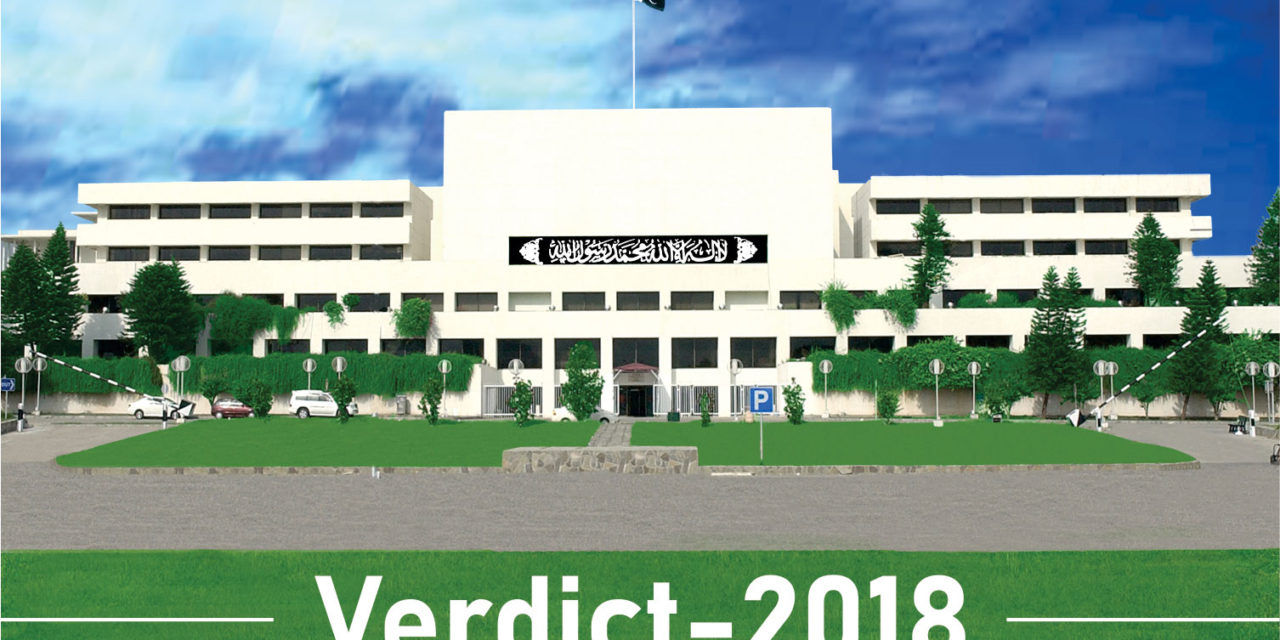Fifty two percent of registered voters in Pakistan reclaimed their right to be governed democratically on 85,000 polling booths throughout the country on July 25, 2018. Out of these 54.82 million voters who renewed Pakistani democracy 21.83 million (forty percent) were women. The 11th General Election on the basis of adult franchise since 1970 has elected 270 out of 272 direct seats in the National Assembly of Pakistan. Election on two seats was postponed after a judicial verdict (NA-60-Rawalpindi) and after death of a candidate (NA-103-Faisalabad).
The 15th National Assembly of Pakistan will witness second civilian-to-civilian smooth transfer of power in the 71-year of troubled political history of Pakistan. In Election-2018 one hundred five political parties and two electoral alliances tried their electoral luck, but only twelve could earn the mandate. Pakistan Tehrik-i-Insaf led by Imran Khan won 116 general seats, the out-going ruling party Pakistan Muslim League-of ousted premier Nawaz Sharif remained second with 64 seats and Pakistan People’s Party won 43 seats. Besides 13 independents three political parties; namely Awami National Party, Jamhoori Wattan Party and Awami Muslim League are single legislator parties. Muttahida Qaumi Movement won 6, Pakistan Muslim League-Quaid-i-Azam got 4, Balochistan National Party won 3 and Balochistan Awami Party won 4 seats. Alliance of 6-religious parties Muttahida Majlis-e-Amal won 12 seats, while the other electoral alliance Grand Democratic Alliance won two seats.
Eight women and one non-Muslim Pakistan won direct seats in Election-2018. For first time in the erstwhile Federally Administered Tribal Areas out of 12 direct seats 10 were won by political parties. The two independents are ardent supporters of Paushtun Tahafuz Movement. These were the last elections in FATA as it has been merged in Khyber Pakhtunkhwa and next time their seats will be part of the provincial aggregate. In Khyber Pakhtunkhwa-traditionally a swing province, Pakistan Tehrik-i-Insaf surprised by reclaiming the province for second consecutive term both for the National and Provincial Assembly.
In Punjab though the party of former premier, Nawaz Sharif won more seats in the national and provincial assembly but lost its stronghold to Pakistan Tehrik-i-Insaf. The close contest in Punjab has paved the way to power for Imran Khan’s Pakistan Tehrik-i-Insaf in ostensibly a hung parliament with the help of new and old allies and inclusion of independents.
In Sindh Pakistan Peoples Party led by Bilawal Bhutto Zardari-son of late Benazir Bhutto held the fort both at the national and provincial level. In Balochistan newly formed Balochistan Awami Party is poised to form a coalition government.
The Election-2018 has made Pakistan Tehrik-i-Insaf as the new federalist political party in a highly divided polity. The party has won all the three seats of federal capital-Islamabad, 60 seats in Punjab, 15 seats in Sindh (mostly Urban-Karachi), 30 in Khyber Pakhtunkhwa and 6 in erstwhile FATA.
Brief history of Elections in Pakistan on the basis of adult franchise
| S.no | Elections based on adult franchise | National | Provincial | Joint or Separate Electorate | Turnout |
| 1 | 1970 | Dec. 7, 1970 | Dec. 17, 1970 | Joint | 59.8 percent |
| 2 | 1977 | March 7, 1977 | March 10, 1977 | Joint | 55 percent |
| 3 | 1985 (Party-less) | Feb. 25, 1985 | Feb. 28, 1985 | Separate | 59.8 percent |
| 4 | 1988 | Nov. 16, 1988 | Nov. 19, 1988 | Separate | 43.07 percent |
| 5 | 1990 | Oct. 24, 1990 | Oct. 27, 1990 | Separate | 45.46 percent |
| 6 | 1993 | Oct. 6, 1993 | Oct. 9, 1993 | Separate | 40.28 percent |
| 7 | 1997 | Feb. 3, 1997 | With national | Separate | 35.17 percent |
| 8 | 2002 | Oct. 10, 2002 | With national | Joint | 41.8 percent |
| 9 | 2008 | Feb. 18, 2008 | With national | Joint | 44.8 percent |
| 10 | 2013 | May 11, 2013 | With national | Joint | 55 percent |
| 11 | 2018 | July 25, 2018 | With national | Joint | 52.4 percent |


